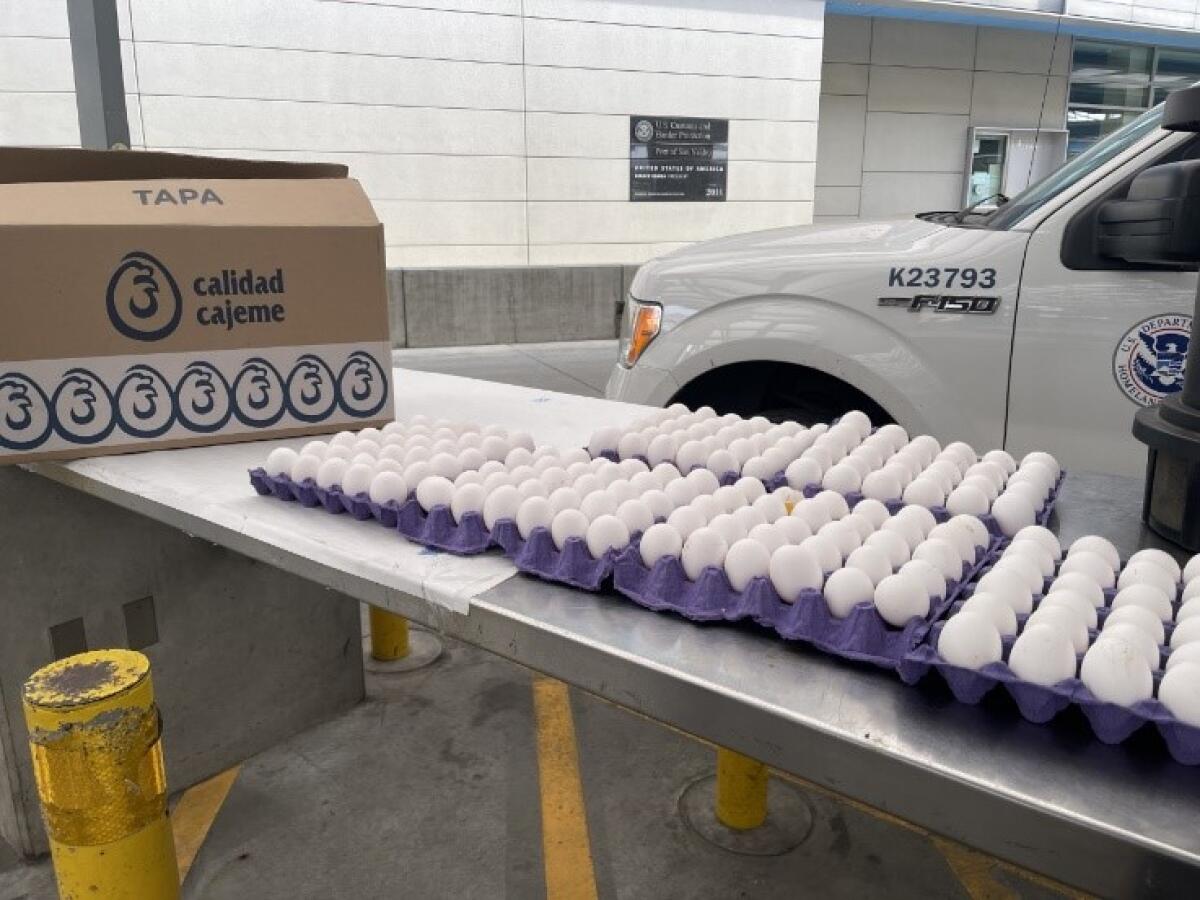Eggs are so expensive, Californians are trying to bring them across the border from Mexico

- Share via
With egg prices spiking in California, Border Patrol agents have noticed a rise in the number of people trying to bring eggs across the border from Mexico, which is illegal.
Inflation and bird flu have also pushed up egg prices in Mexico, but the cost of a dozen eggs south of the border is still much lower — up to half as much — as in the U.S., tempting some border crossers to look for new ways to fill their fridges with cheaper eggs.
“They are significantly less expensive in Mexico than the U.S.,” said Gerrelaine Alcordo, spokesperson for Customs and Border Protection in San Diego. “This is also occurring with added frequency at other Southwest border locations as well.”
Despite the potential savings for border crossers, customs officials are warning: Don’t try it.
Customs and Border Protection’s San Diego office tweeted out a reminder last month that uncooked eggs are not allowed into the U.S. from Mexico because of the risk of spreading bird flu and Newcastle disease. The danger does not come from eating the eggs. According to the Centers for Disease Control and Prevention, no bird flu infections have been reported from people eating properly cooked eggs or poultry. Instead, the risk comes from touching surfaces contaminated with the virus, such as unwashed egg shells and soiled containers, experts say.
At the San Diego field office, border agents seized eggs and poultry products during 1,512 inspections between Oct. 1 and Dec. 31, an increase of 384% when compared to the previous year, according to numbers provided by the agency.
Other ports of entry at the southern border have seen similar surges.
At the Tucson field office in Arizona, agents seized eggs and poultry items 701 times during the same time period, a jump of 300% from the previous year.
In Texas, Charles Payne, the customs agency’s supervisory agriculture specialist, told the Border Report news site that agents there had seen an increase of 108% in the number of eggs seized from Oct. 1 to Dec. 31.
In Laredo, agents have seen a 313% increase.
The cost for a dozen eggs in the U.S. dropped slightly by February, but customs officials said they are still seeing people trying to bring in eggs from Mexico.
“We continue to see higher than average numbers of prohibited poultry products,” Alcordo said. “Even one uncooked egg is too many, due to the risk it could pose to American agriculture.”
Despite the spike in egg seizures at the border, Alcordo said most attempts to cross the border with raw eggs had not been surreptitious smuggling efforts or large-scale operations.
Instead, many of the incidents involve border crossers who declare the eggs at the inspection stations and expect to bring them into the United States. It’s there that they are told the items aren’t allowed and must be turned over.
“Generally, the items are being declared during the primary inspection, and when that happens the person can abandon the product without consequence,” Alcordo said in an email. “CBP agriculture specialists will collect and then destroy the eggs.”
Only a “very small number of cases” have involved incidents where the eggs are not declared and instead found during an inspection. In those instances, the eggs are also seized, and the individual can face a fine of $300 or up to $10,000 for repeat offenders, she said.
The increase in eggs being spotted at the border follows a steep rise in egg prices in California.
The cost of eggs at grocery stores across California suddenly jumped because of an outbreak of highly pathogenic avian influenza, or bird flu, that has killed tens of millions of chickens across the country.
The disease affected hens throughout 2022, resulting in 29% fewer eggs in the market during the last week of December than the beginning of the year, according to the U.S. Department of Agriculture, even though demand for eggs typically spikes in December.
More than 43 million chickens were lost in 2022, according to the agency.
While a dozen large eggs were priced at about $2.35 about a year ago, the average retail price jumped to $7.37 in California in the beginning of January. Prices have lowered somewhat, but the same carton this week will cost about $5.74, according to the USDA.
The increase has been particularly hard on Californians, who already pay higher egg prices than others due to Proposition 12, which required that hens be cage-free in 2022.
Meanwhile across the border, eggs can be purchased for much cheaper. In Tijuana, a dozen eggs are priced at about 44.90 pesos, or $2.30, according to Mexico’s consumer protection agency, which monitors the prices of essential food and cleaning products.
According to Forbes, the cost of eggs in Mexico has been steadily but gradually rising for years. The news agency reports that the price has jumped partly due to the bird flu outbreak, as in the U.S., as well as an ongoing drought, inflation and safety in the country’s highways.
Uncooked poultry and eggs have been prohibited from entering the U.S. from Mexico since 2012 by the USDA due to high cases of highly pathogenic avian influenza, or HPAI, and Newcastle disease.
According to the USDA, there have been no human cases of Newcastle disease, but the illness is highly contagious to poultry, causing some to die without showing symptoms.
Avian influenza cases in humans are also rare, according to the USDA, but also highly contagious and deadly to chickens.
“With food and agriculture products, the best advice to travelers is to always declare it,” Alcordo said. “If they are declared and deemed prohibited, they can be abandoned without consequence.”
More to Read
Sign up for Essential California
The most important California stories and recommendations in your inbox every morning.
You may occasionally receive promotional content from the Los Angeles Times.











